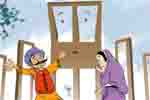 Street theatre productions highlighting the spirit of the language movement are hardly produced to be staged in the street theatre festivals organised at the Central Shaheed Minar in February.
Street theatre productions highlighting the spirit of the language movement are hardly produced to be staged in the street theatre festivals organised at the Central Shaheed Minar in February.
For over two decades Bangladesh Group Theatre Federation observes Ekushey organising a weeklong street theatre festival at Central Sheed Minar in the first week of February and Shammilita Sanskritik Jote holds a 15-day programme from the second week of February at the venue.
Though the theatre organisers take credit for staging hundreds of street theatre productions satirising the socio-political turmoil in these programmes, the spirit of language movement as a theme never gets highlighted.
Yet, the contemporary playwrights and directors say that the ’21st February does not fall into their immediate experience, and it is a bit difficult to produce plays on it.’
The theatre leaders, however, highlight the spirit of the language movement in the rallies and seminars.
The leaders can refer to only two plays on the theme written and produced so far in the past 62 years since the language movement in 1952.
One of the two plays is martyred intellectual Munier Chowdhury’s Kabar that the imprisoned playwright wrote during the volatile movement in 1952. Another one is Kaiser Ahmed’s Bayannor Shakun, which is not staged anymore by any troupe after 1980s.
Only Munier Chowdhury’s play is staged as mainstream theatre and street theatre productions these days.
The theatre activists, however, admit that the need for focusing on the theme is more necessary and relevant, following the declaration of 21st February as International Mother Language Day.
‘It is really lamentable that 21st February has not been a major theme in our theatre practice. In fact, the topic is virtually absent from other creative genres too, except poetry. More plays on the theme should be produced and staged,’ says thespian Nasiruddin Yusuff, who is also the president of Sammalita Sangskritik Jote.
Another thespian Mamunur Rashid explains, ‘It deserves huge research to write a play on the historical event like language movement, which needs tremendous efforts and commitment.’
As a result, the playwrights focus on the contemporary issues for their awareness generating street theatres such as war crimes tribunal, share market scam and contemporary political violence.
Nasiruddin Yusuff suggests that Shammilita Sanskritik Jote, Bangladesh Group Theatre Federation and the Bangladesh Patha Natak Parishad should work together to produce plays on the language movement and stage them frequently, especially at the programmes organised to celebrate International Mother Language Day.
Mannan Hira, president of Bangladesh Patha Natak Parishad, says, ‘We will contact and request theatre troupes across the country to produce productions on the language movement in the years to come’.
‘We did not think about issue. But, it will be considered seriously,’ Jhuna Chowdhury, secretary general of Bangladesh Group Theatre Federation told New Age.
-With New Age input




















